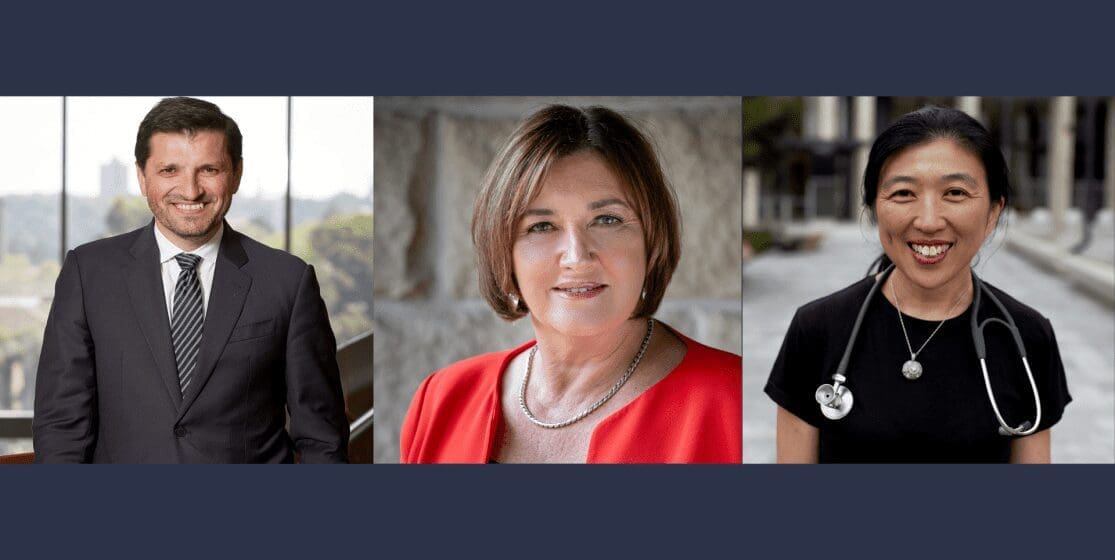How do you balance research and clinical work? What are the advantages of this career? Leading clinician-scientists shared their stories with an online audience for our 2021 event, discussing the challenges and opportunities of going from patient bedside to laboratory bench.
You can watch recordings of their presentations in our video library, or read on for some event highlights.
Professor Vlado Perkovic FAHMS, Dean of Medicine and Scientia Professor at UNSW, specialises in nephrology – the diagnosis and treatment of kidneys.
He described himself as an “accidental academic” and was the first in his family to go to university.
“I had no idea where I was going or where my path was going to take me,” he said.
Professor Perkovic chose to study medicine, and tried different research and clinical paths before he found the area he wanted to be in.
“It really started to feel like I started to find my path- almost a sense of destiny,” he said. “But it was not easy.”
“It’s wonderful to always be surrounded by people smarter than you, but it’s also a challenge… I had to learn how to work with them… it helped to really push me and drive me to do bigger and better things.”
Professor Perkovic said mentorship and learning how to work in a team were important to success.
“Another key learning for me is that you’ve got to take on the big problems to have impact,” he said.
“I feel incredibly lucky to be in such a rich and rewarding career. I think there is no career like it. And the amazing people I work with is part of that. I feel very fortunate.
“The key message is to be open to opportunities: they’ll come.”
Professor Clara Chow, Professor of Medicine at The University of Sydney, is a cardiologist. She said it was important to be able to be flexible and willing to take risks, as well as think creatively to drive innovation.
“Life as a clinician-academic has been fun for me,” she said.
“I think that thinking flexibly and creatively has really helped me as a clinician-researcher.”
Professor Elizabeth Elliott AM FAHMS, Distinguished Professor, Discipline of Paediatrics and Child Health at The University of Sydney, said her career had come with unexpected rewards.
Professor Elliott came from a family of doctors, many of them also clinician-scientists – but she was uncertain about pursing medicine initially.
“When I set out to look at my career trajectory, it was anything but a straight line… what I did notice, is there was a lot of serendipity along the way,” she said.
“As a clinician-scientist, you do need to be prepared for rejection.
“I think it’s a fabulous career with much variety.”
As a paediatrician specialising in Fetal Alcohol Spectrum Disorders, Professor Elliott often works with vulnerable and marginalised children.
“With privilege comes obligation, you must speak up for those who can’t,” she said.
Associate Professor Michelle Farrar is a Professor of Neurology at UNSW. She was originally going to do a masters when a mentor suggested changing to a PhD.
Associate Professor Farrar said when starting a PhD to “pick a supervisor, someone that’s out of the box, someone that’s interested and approachable”.
As a clinician-scientist, Associate Professor Farrar said listening to families and patients was the most important part of the job – they should set the agenda, and ask the questions that science can answer.
“As clinicians, we are in such a privileged position to take these questions back to research and try and solve them,” she said.
Associate Professor Farrar said clinical trials could be difficult, especially when initial results were not always positive.
“We need to be brave, back the science, bring knowledge and bring change,” she said.
“You do the best you can at the time, but also ask: how can I do better tomorrow?”
Professor Matthew Kiernan AM FAHMS, Bushell Chair of Neurology and Co-Director of the Brain and Mind Centre at The University of Sydney, said being a clinician-scientist was a very fulfilling career.
“It’s an extremely rewarding role, it’s a real privilege to be able to literally take my research from the lab and apply it to patients” he said.
“It’s great to be able to understand clinical presentations, bring these together with research observations, and use this to diagnose and treat patients, while at the same time, drive future therapeutic interventions.”
Find out more about our Life as a Clinician-Scientist events on our program page.

